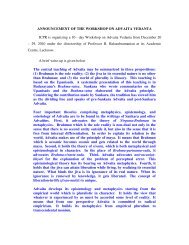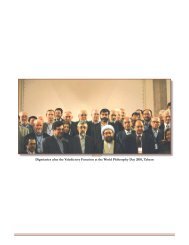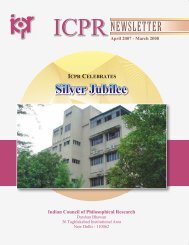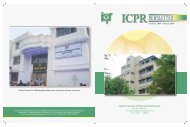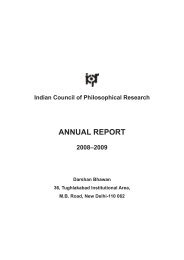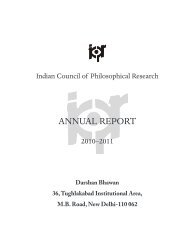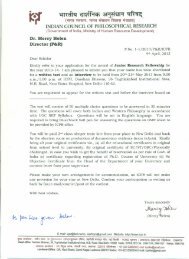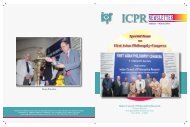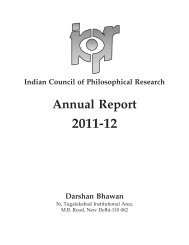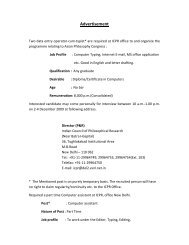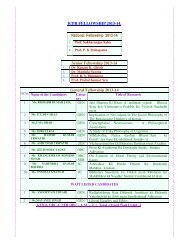INTRODUCTION - Indian Council of Philosophical Research
INTRODUCTION - Indian Council of Philosophical Research
INTRODUCTION - Indian Council of Philosophical Research
You also want an ePaper? Increase the reach of your titles
YUMPU automatically turns print PDFs into web optimized ePapers that Google loves.
<strong>INTRODUCTION</strong>Among all different knowledge-systems and academicdisciplines evolved and developed by humankind fromatomic science to zoology, philosophy is the very firstand also the foremost. From the very beginning, philosopherstried to find out answers to all kinds <strong>of</strong>questions concerning whatever subject matter underthe sun which interested themósay from plants to planetsóbutgradually, different special sciences likeastronomy and botany developed and took away manyquestions from philosophy into their own special fields.Yet, several fundamental questions could not be takenaway in this manner and subjects such as nature <strong>of</strong>being continue to remain exclusively in the domain <strong>of</strong>philosophy. Further, today philosophy is the only trulyinter-disciplinary subject that can still attempt to integrateknowledge for a wholesome understanding <strong>of</strong>humans and their place in the universe and attempt t<strong>of</strong>ind answers to questions like, ìAre there values thatshould be governing human life?î, ìWhat is truth?î,ìWhat is reality?î, ìWhat is virtue?î, ìWhat is beauty?îand so on. These questions have been asked all overthe world, in all cultures and at different times. Indiatoo was no exception and in fact one <strong>of</strong> the worldísoldest systems <strong>of</strong> thinking and speculation on suchmatters began more than five thousand years ago evenbefore the Vedas.When it comes to persistently asking the most basicquestions concerning man, his life and goals, the worldand its nature as well as constituents, India has a longand brilliant record. What began many millennia agohas continued up to now in an unbroken chain <strong>of</strong> tradition.From the heights <strong>of</strong> skepticism to the depths <strong>of</strong>mysticism, every possible shade <strong>of</strong> philosophizing wasintensely explored, vehemently criticized, or ardentlyaccepted and defended by <strong>Indian</strong> thinkers. This explo-1
ation was unbelievably holistic and a spirit <strong>of</strong> synthesispervaded <strong>Indian</strong> culture, religion and philosophyjust as strongly as a spirit <strong>of</strong> incisive analysis. Theanalytical rigour as well as the synthetic spirit <strong>of</strong> classicalIndia have few parallels elsewhere. In Indiaphilosophy is not confined to mere arm-chair speculations;it is intensely practical. Consequently, philosophyand religion went hand in hand, which has had itsadvantages as well as drawbacks. Because <strong>of</strong> theunique capacity <strong>of</strong> <strong>Indian</strong> culture to hold together withinits fold contrary as well as contradictory elements, rigorousphilosophy never really got disconnected fromreligious faith as it happened in the West. On the contrary,philosophical thinking was harmonized withreligion as well as spirituality. Philosophy and spiritualityare seen as just two ends <strong>of</strong> a continuum in India.As a result, whether it is Vedånta belonging to theorthodox Vedic fold or Buddhism and Jainism belongingto the opposite, heterodox fold, they all are alikeboth philosophies and religions simultaneously, culminatingin sublime spirituality.Another characteristic feature <strong>of</strong> most schools <strong>of</strong> <strong>Indian</strong>philosophy is their soteriological orientation. Theseschools believe that the ultimate goal <strong>of</strong> philosophicalpursuit is to enable a person to attain final release orliberation. One needs a higher kind <strong>of</strong> knowledge to getliberated and such knowledge can be attained onlythrough philosophy. This is the reason why philosophyhas been given the highest place <strong>of</strong> importance in India.The distinction between higher knowledge and lowerknowledge is as old as the Upanisads themselves.While reason is given a high place in the humanendeavor to discover truth, it is not seen as the onlygateway to realizing truth. Reason, by itself, may notbe able to help anyone attain liberating knowledge butstill it is an invaluable tool assisting in meaningful waysin the process <strong>of</strong> attaining higher knowledge. Thougha ëlife <strong>of</strong> reasoní is required, it alone is not enough for2
liberation. This fact has led to a very wide-spread andpersistent belief in the West that in all <strong>Indian</strong> philosophies,the authority <strong>of</strong> scriptures has a much higherplace than reason. The fact mentioned earlier that philosophyand religion do not stand separated in the<strong>Indian</strong> tradition substantially adds to the above misconception.Since most schools <strong>of</strong> <strong>Indian</strong> philosophy aimed atliberation, it is not very difficult to see the smooth transitionfrom philosophy to spirituality in the <strong>Indian</strong>tradition. But, despite this common interest in spirituality,<strong>Indian</strong> schools <strong>of</strong> philosophy are still quite radicallydifferent from one another. Goal-oriented thinking hasnot resulted in any kind <strong>of</strong> uniformity in philosophicalthought. There are just as many kinds <strong>of</strong> schools asone may find in the West. There are even severalschools which fairly closely resemble schools <strong>of</strong> Westernthought. It was readily agreed across the board inIndia that even if ultimate reality is the same, it can stillbe viewed and described in radically different ways.Each such way <strong>of</strong> viewing was a ëdarsanaí and anydarsana was just as good as any other.This diversity <strong>of</strong> dar‹anas is also rooted in the classical<strong>Indian</strong> belief in the diversity <strong>of</strong> human competenceand understanding which is due to the fact <strong>of</strong> differentpersons possessing different kinds and levels <strong>of</strong> abilitiesas well as being constituted differently. There arepeople <strong>of</strong> a nature basically constituted <strong>of</strong> faith anddevotion, there are people who, by nature, are men <strong>of</strong>action and there are also people who are by naturevery rational in their outlook. These are radical differencesin temperaments and outlook which will alsocreate differences in the ways <strong>of</strong> understanding. In fact,it is a well accepted idea in India that there are multiplepaths to liberation and that they fall into threebroad types <strong>of</strong> paths: the path <strong>of</strong> action (karma-mårga),the path <strong>of</strong> devotion (bhakti-mårga) and the path <strong>of</strong>knowledge (j¤åna-mårga).3
The range <strong>of</strong> topics investigated by different <strong>Indian</strong>philosophical systems is indeed very vast, very variedas well as very thorough. The dialectical skills <strong>of</strong> several<strong>Indian</strong> philosophers is only to be seen to bebelieved. To put it all in one sentence, the tradition isvery rich and priceless, matching in excellence evenwhen compared with the best in the world.This incomparable philosophical tradition went ondeveloping even when there was foreign occupation<strong>of</strong> the land because even during the time <strong>of</strong> the Moghulrulers it continued to flourish. The first setback cameonly when the British took control <strong>of</strong> a vast region <strong>of</strong>the country and introduced their own system <strong>of</strong> education.The new system <strong>of</strong> education not only took nonote <strong>of</strong> the age old native tradition but tried to replaceit completely. If the traditional ways <strong>of</strong> philosophizingstill continued to be practiced it was only because <strong>of</strong>patronage by kings big and small, zamindars andnoblemen. The tradition did not die, but became weakand stunted in its growth.The new system <strong>of</strong> education also brought with it anew philosophy little known to <strong>Indian</strong>s. RegrettablyWestern philosophy became the sole philosophy taughtin the colleges under the new system <strong>of</strong> educationbecause that was the only philosophy its teachers(mostly Englishmen) knew. <strong>Indian</strong>s took up the study<strong>of</strong> Western philosophy without any qualms or inhibitionsand in course <strong>of</strong> time it became the dominantphilosophy that was taught, studied and researched inthe colleges and universities in British India. Evenseveral decades after independence, it continued toenjoy a privileged position in most departments <strong>of</strong>philosophy in <strong>Indian</strong> universities. Every newdevelopment in the West is keenly observed and alsoabsorbed by several scholars in India.In this way, India has come to be the home land <strong>of</strong>its own native philosophies and it is also a second4
home for many philosophies <strong>of</strong> the West. In this respect,there is no country in the whole world which islike India in having all the major and sometimes evenminor philosophies <strong>of</strong> the world in addition to its ownnative philosophies. Current <strong>Indian</strong> philosophy is trulypluralist. Just as ancient India accommodated withinits space religions <strong>of</strong> foreign origin like Parsi, Jewish,Muslim and Christian, modern India has accommodatedmost <strong>of</strong> the philosophies that have originated in theWest. Thus there is room for every conceivable kind <strong>of</strong>philosophy on <strong>Indian</strong> soil and in <strong>Indian</strong> minds. This isthe reason why there exists only in Indiaóunlikeanywhere else in the worldóan <strong>Indian</strong> <strong>Council</strong> <strong>of</strong> <strong>Philosophical</strong><strong>Research</strong> fully funded by the Ministry <strong>of</strong>Human Resource Development <strong>of</strong> the Government <strong>of</strong>India. This <strong>Council</strong> very justifiably promotes and fundsresearch in any philosophyó<strong>Indian</strong> or Western or justany other.5
HISTORY AND OBJECTIVES<strong>Indian</strong> <strong>Council</strong> <strong>of</strong> <strong>Philosophical</strong> <strong>Research</strong> (ICPR) wasestablished in 1977 by the Ministry <strong>of</strong> Education, Government<strong>of</strong> India as an autonomous organizationdesigned to bring back the entire tradition <strong>of</strong> <strong>Indian</strong>philosophy to its pristine and original form and providerequired impetus to nurture and promote new thinkingthrough its intensive programs <strong>of</strong> research. This wasthe result <strong>of</strong> the decision <strong>of</strong> a Committee which hadbeen formed to look into the possibility <strong>of</strong> raising abody like ICSSR and ICHR exclusively for the discipline<strong>of</strong> philosophy, for the preservation <strong>of</strong> Indiaíspr<strong>of</strong>ound, long and living philosophical tradition. Consideringthe uniqueness and importance <strong>of</strong> the subjectwhich was all comprehensive and holistic, the Committeefelt the need to strongly recommend that in orderto protect the greatest achievements which are recordedin the field <strong>of</strong> philosophy in India and alsopreserve deep pr<strong>of</strong>undities <strong>of</strong> its culture, there was aneed to evolve a Governmental Institution as ICPR. Anargument crucially advanced was that if there is onesingle factor which would command respect and attentionfrom the contemporary world, it would be noneother than the pr<strong>of</strong>ound wisdom contained in <strong>Indian</strong>philosophy.The authorities <strong>of</strong> the Government <strong>of</strong> India were convincedthat more than any other discipline <strong>of</strong>knowledge, philosophy in India deserved to have anexclusive and special agency in the country, so conceivedand designed that the entire tradition <strong>of</strong> <strong>Indian</strong>philosophy is brought back to its original vigor andfurther developed through various research programs.The chief objective was to portray the l<strong>of</strong>ty philosophicalideals <strong>of</strong> the country and utilize their tenets forreawakening <strong>of</strong> India and empower the entire humanityby extending to it the benefits <strong>of</strong> the accumulatedwisdom <strong>of</strong> India by which human bondage could be6
meaningfully addressed and humanity could be helpedto arrive at progressive perfection at an acceleratedpace.It was felt that this important work could be carriedout, not merely through universities alone or throughany other existing learned body designed to promoteNatural and Human Sciences, but through an independentbody that could function as an autonomousorganization fully funded by the Government and freelydeveloped by eminent philosophers <strong>of</strong> the country. Itwas further envisaged that since philosophy is, by itsvery nature, comprehensive in its approach and sinceit is a study <strong>of</strong> the world as a whole and <strong>of</strong> all domains<strong>of</strong> existence in their intricate interrelationships, it mustbe inter-disciplinary in character.As a result <strong>of</strong> mature deliberations, the then PrimeMinister <strong>of</strong> India, Mrs. Indira Gandhi appreciated andapproved the formation <strong>of</strong> the <strong>Indian</strong> <strong>Council</strong> <strong>of</strong> <strong>Philosophical</strong><strong>Research</strong> (ICPR). In 1977, therefore, theMinistry <strong>of</strong> Education formulated the Memorandum <strong>of</strong>Association (MOA) <strong>of</strong> the ICPR and the organizationwas formed as a Society registered under the Registration<strong>of</strong> Societies Act.The initial years from 1977 to 1981 were marked byvery slow activity on the part <strong>of</strong> the Government and itwas only in 1981 that the ICPR started functioningwhen Pr<strong>of</strong>essor D.P. Chattopadhyaya was appointedthe founder Chairman <strong>of</strong> the <strong>Council</strong>. The <strong>Council</strong>began to function from his residence in the initial daystill the <strong>of</strong>fice was shifted to an independent accommodationin Vasant Vihar. Later, the <strong>of</strong>fice was shifted toGuru Nanak Foundation and subsequently to USOHouse. In 1987, the <strong>of</strong>fice was again shifted to RajendraBhavan, where ICPR could be stabilized ins<strong>of</strong>ar asbasic, physical accommodation was concerned.It was during this initial period that the <strong>Council</strong> madegreat efforts to get the authorities allot a piece <strong>of</strong> land7
for ICPR by the Delhi Development Authority to constructa permanent <strong>of</strong>fice for the ICPR. Ultimately, DDAallotted the required land at 36 Tughlakabad InstitutionalArea, where the present building <strong>of</strong> the ICPRwas built during the years 1990-1996. The building <strong>of</strong>the ICPR was inaugurated in 1999 by the then Minister<strong>of</strong> HRD, Dr. Murli Manohar Joshi and the <strong>of</strong>fice hasbeen functioning here since then.Along side the head-quarters <strong>of</strong> Delhi, there werewide consultations to build an Academic Centre with aworld class library in philosophy to cater to the needs<strong>of</strong> those who are interested in Philosophy. Shri C.P.N.Singh, the then Governor <strong>of</strong> Uttar Pradesh took theinitiative and came up with a gracious <strong>of</strong>fer to housethe Academic Centre at the Butler Palace in Lucknow.It may be mentioned here that the palace was built in1922 by the Rajah <strong>of</strong> Mehmoodabad as the residence<strong>of</strong> Sir Harcourt Butler, the then Governor. After independence,it remained vacant for a while and wasdeclared as ìenemy propertyî in 1965 and was broughtunder the control <strong>of</strong> Ministry <strong>of</strong> Commerce. The UPGovernment used it as the Sales tax <strong>of</strong>fice till it wasgiven to ICPR in 1981. The Academic Centre startedfunctioning with Pr<strong>of</strong>essor T.K. Sarkar as the Directorfrom 1983. With the efforts <strong>of</strong> the <strong>Council</strong>, and especiallywith the hard work put in by Pr<strong>of</strong>essor R.R.Verma, formerly Director at the Academic centre, ButlerPalace became a hub <strong>of</strong> philosophical activitieswith an up-to-date specialized library containing 32,000volumes and yearly subscription to 110 journals, a guesthouse, well equipped seminar room, exhibition halland an <strong>of</strong>fice. The Centre was brimming with activitieswith large number <strong>of</strong> students and researchers visitingAcademic Centre library apart from regular seminarsbeing organized there. In 2006, because <strong>of</strong> SupremeCourt judgment against the UP government, the ICPRwas asked to vacate the Butler Palace and wasforced to locate it in PCF Building, Lucknow which8
unfortunatly inadequate in every respect for the academicrequirement <strong>of</strong> the ICPR. The presentadministration is making all efforts to find a suitableplace to house the library and restart the academicactivities at the Centre.In all these years, ICPR devoted itself to the task <strong>of</strong>furthering the activities for the development <strong>of</strong> philosophyin India and laid out its plans for its progressiveactivities. They are as follows:1. Setting up a Journal <strong>of</strong> the <strong>Indian</strong> <strong>Council</strong> <strong>of</strong><strong>Philosophical</strong> <strong>Research</strong>; (JICPR)2. Developing programs to assimilate in condensedform some <strong>of</strong> the important achievements<strong>of</strong> <strong>Indian</strong> philosophers, and publishing a series<strong>of</strong> books focused on important problems <strong>of</strong> ontology,epistemology, ethics, social and politicalphilosophy and <strong>Indian</strong> spirituality, works relatedto living philosophers <strong>of</strong> India. Also books thatbring out <strong>Indian</strong> expertise in regard to Westernphilosophy.3. Developing schemes for seminars, workshopsand refresher courses that aim at promoting veryhigh level research in philosophy by the philosophicalcommunity <strong>of</strong> India on themes relevantto the recovery <strong>of</strong> ancient classical systems <strong>of</strong><strong>Indian</strong> philosophy and relevant also to theprogress <strong>of</strong> contemporary <strong>Indian</strong> philosophy thatwould find for itself a high place in the contemporaryscene <strong>of</strong> philosophy in the world at large.This program also envisaged empowerment <strong>of</strong>young and budding scholars and providing trainingto philosophers, old and new, so that theycould think on new lines on philosophical topicsand issues which would be analytic as wellas synthetic in character.4. Initiating special programs through which teaching-learningmaterial could be produced that9
would facilitate study <strong>of</strong> philosophy in the countryin a manner that would be pedagogicallysound and academically refreshing.5. Initiating special programs for young scholars inthe country to meet together over an annual essaycompetition followed by a high level seminar.6. Establishing fellowship schemes <strong>of</strong> differentkinds.7. Establishment <strong>of</strong> relationships with various organizations<strong>of</strong> philosophy in India, in theuniversities and in the colleges.8. Establishment <strong>of</strong> relationships with eminent philosophersin different parts <strong>of</strong> the world andfamous institutions <strong>of</strong> philosophy in the world.9. Preparing exhibitions on philosophical themes,whereby subtle concepts <strong>of</strong> philosophy couldbe transmitted to students, teachers and thegeneral public through artistic forms that wouldbe at once instructive and aesthetically enjoyable.10. Organization <strong>of</strong> international conferences onphilosophy, including the one inaugurated bythe then Prime Minister <strong>of</strong> India, Mrs IndiraGandhi, (October 10, 1984) which brought togetherthe philosophers <strong>of</strong> East and West for afruitful exchange <strong>of</strong> ideas and experiences.11. Selection <strong>of</strong> philosophers <strong>of</strong> India for participationin international conferences held abroad,resulting in the promotion and propagation <strong>of</strong><strong>Indian</strong> philosophy in the contemporary philosophicalcommunity.12. Development <strong>of</strong> a world class library <strong>of</strong> philosophy,which is located now in Lucknow which isperhaps the best in Asia today.10
13. Establishment <strong>of</strong> close relationship with the Government<strong>of</strong> India for collaborative projects asalso for promoting interdisciplinary research inthe country.The main aims and objectives <strong>of</strong> the <strong>Council</strong> are asfollows:“ Striving for excellence, creativity and originalityin philosophical research within the country.“ Promoting and encouraging indigenous interdisciplinaryresearch and cross-cultural studies.“ Strengthening the teaching <strong>of</strong> philosophy so asto encourage brilliant students to take up thestudy <strong>of</strong> philosophy.“ Dovetailing teaching and research by providingimpetus and additional training to philosophyteachers.“ To identify and encourage inter-disciplinary researchespecially on topics that are intellectuallychallenging, especially those that are concernedwith national planning and development.“ To review the progress <strong>of</strong> research in philosophyfrom time to time.“ To sponsor or assist projects or programs <strong>of</strong>research in philosophy.“ To give financial support to institutions and organizationsengaged in research activities inphilosophy.“ To provide technical assistance or guidancefor the formulation <strong>of</strong> research projects andprograms in philosophy, by individuals or institutions,and/or organizing and supportinginstitutional or other arrangements for trainingin research methodology.11
“ To indicate periodically areas in and topics onwhich research in philosophy should be promotedand to adopt special measures for thedevelopment <strong>of</strong> research in neglected or developingareas in philosophy.“ To co-ordinate research activities in philosophyand to encourage programs <strong>of</strong> inter-disciplinaryresearch.“ To organize, sponsor and assist seminars, specialcourses, study circles, working groups/unitsand conferences for promoting research in philosophy,and to establish institutes for the samepurpose.“ To give grants for publication <strong>of</strong> digests, journals,periodicals and scholarly works devotedto research in philosophy and also to undertaketheir publication in select cases.“ To institute and administer fellowships, scholarshipsand awards for research in philosophy bystudents, teachers and others.“ To develop and support documentation services,including maintenance and supply <strong>of</strong> data,preparation <strong>of</strong> inventories <strong>of</strong> current research inphilosophy and compilation <strong>of</strong> a national register<strong>of</strong> philosophers.“ To promote collaboration in research between<strong>Indian</strong> philosophers and philosophical institutionsand those from other countries.“ To take special steps to develop a group <strong>of</strong> talentedyoung philosophers and to encourageresearch by young philosophers working in universitiesand other institutions.“ To organize academic exchange program withother countries and help scholars with travelgrants to participate in international events inphilosophy organized abroad.12
“ To advise the Government <strong>of</strong> India on all suchmatters pertaining to teaching and research inphilosophy as may be referred to it by the Governmentfrom time to time.“ To enter into collaborations with other institutions,organizations and agencies, on mutuallyagreed terms, for the promotion <strong>of</strong> research inphilosophy.Life Time Achievement Award given to Pr<strong>of</strong>essor Daya Krishnareceived by Dr. Shail Mayaram13
ORGANISATIONAL SET-UPThe <strong>Council</strong> has a broad-based membership comprising<strong>of</strong> distinguished philosophers, social scientists,representatives <strong>of</strong> the University Grants Commission,<strong>Indian</strong> <strong>Council</strong> <strong>of</strong> Social Science <strong>Research</strong>, <strong>Indian</strong><strong>Council</strong> <strong>of</strong> Historical <strong>Research</strong>, <strong>Indian</strong> National ScienceAcademy, the Central Government and theGovernment <strong>of</strong> Uttar Pradesh. The Governing Body(GB) and the <strong>Research</strong> Project Committee (RPC) arethe main implementing agencies <strong>of</strong> the <strong>Council</strong>. Thesebodies are vested with well-defined powers and functions.The Governing Body, which consists <strong>of</strong>Chairman, Member-Secretary, not less than three andnot more than eight members appointed by the <strong>Council</strong>,a representative each <strong>of</strong> the Ministry <strong>of</strong> HumanResource Development and Ministry <strong>of</strong> Finance andtwo nominees <strong>of</strong> the Government <strong>of</strong> Uttar Pradesh,administers, directs and controls the affairs <strong>of</strong> the <strong>Council</strong>.The <strong>Research</strong> Project Committee, which includesthe Chairman, not less than five and not more thannine members appointed by the <strong>Council</strong> and the Member-Secretary,scrutinizes and sanctions grants-in-aidfor the projects and other proposals received or plannedby the <strong>Council</strong>. The Finance Committee scrutinizesthe budget estimates and other proposals involvingexpenditure.The Chairman and the Member-Secretary who areappointed by the Central Government are vested withwell-defined powers and duties. Currently, Pr<strong>of</strong>essorK. Ramakrishna Rao is the Chairman, who joined thecouncil on 6 June 2006 and Pr<strong>of</strong>essor GodabarishaMishra is the Member Secretary who joined on 7thSeptember 2007. The <strong>Council</strong> has three Directors,1. Administration and Finance, 2. Planning and<strong>Research</strong>, 3. Academic. Apart from the above, the14
<strong>Council</strong> has a Programme <strong>of</strong>ficer, and an AccountsOfficer working for ICPR at its Head <strong>of</strong>fice.SUCCESSIVE CHAIRMEN OF THE ICPRPr<strong>of</strong>essor D.P. Chattopadhyaya01.07.1981 to 17.07.1990Pr<strong>of</strong>essor R. Balasubramanian18.07.1990 to 31.03.199415
Pr<strong>of</strong>essor Mrinal Miri05.04.1994 to 11.04.1997Pr<strong>of</strong>essor V. Venkatachalam12.04.1997 to 05.06.200016
Pr<strong>of</strong>essor Kireet Joshi06.06.2000 to 05.06.2006Member Secretary 01.07.1981 to 31.12.1991Pr<strong>of</strong>essor K. Ramakrishna Rao06.06.200617
SUCCESSIVE MEMBER-SECRETARIES OF ICPRPr<strong>of</strong>essor Bhuvan Chandel1.1992 to 31.12.1994Pr<strong>of</strong>essor Ashok Vohra28.06.1995 to 26.06.199818
Pr<strong>of</strong>essor R.C. Pradhan1.06.2000 to 31.05.2003Pr<strong>of</strong>essor S.R. Vyas09.3.2004 to 05.02.200719
Pr<strong>of</strong>essor G. Mishra07.09.2007HRD Minister presenting Life Time Achievement Award toPr<strong>of</strong>essor K. Satchidananda Murty recieved by Y.V. Satyanarayana.20
AREAS OF ACTIVITIESSome priority areas in which ICPR has been concentratingall these years are:1. Varieties <strong>of</strong> abiding experience and their relevanceto philosophy;2. Theories <strong>of</strong> truth and knowledge;3. Basic values embodied in <strong>Indian</strong> culture andTheir relevance to national reconstruction;4. Normative inquiries;5. Philosophy, science and technology;6. Interdisciplinary inquiries with philosophy as afocal discipline;7. Philosophy <strong>of</strong> man and the environment;8. Social and political philosophy and philosophy<strong>of</strong> law;9. Logic, philosophy <strong>of</strong> mathematics and philosophy<strong>of</strong> language;10. Metaphysics;11. Comparative and critical studies in the philosophicalsystems.12. Philosophy <strong>of</strong> education.ACADEMIC CENTRE, LUCKNOWThe Academic Centre <strong>of</strong> the ICPR, is presently locatedat the Right Wing <strong>of</strong> 2 nd Floor <strong>of</strong> PCF Building, 32Station Road, Lucknow. It houses an up-to-date specializedlibrary in philosophy, and a small <strong>of</strong>fice <strong>of</strong> the<strong>Council</strong>. The total acquisition <strong>of</strong> books by the library atthe Academic Centre, Lucknow, is about 32000 volumes.It subscribes to 110 philosophical journals andreceives 27 journals on exchange basis.21
The library is in the process <strong>of</strong> being fully computerizedto extend the services more effectively and tonetwork with other libraries. Online facilities will beprovided so that the books can be accessed from anywherein the country.FELLOWSHIPSThe Fellowship scheme <strong>of</strong> the <strong>Council</strong> is one <strong>of</strong> themain schemes by which research among scholars isencouraged. Under this scheme the <strong>Council</strong> awardsdifferent categories <strong>of</strong> fellowships to assist the scholarsto engage in research on full time basis on themes<strong>of</strong> contemporary relevance and those that fit in with theselected major areas <strong>of</strong> the <strong>Council</strong>.“ Theories <strong>of</strong> truth and knowledge.“ Basic values embodied in <strong>Indian</strong> culture andtheir relevance to national reconstruction.“ Normative inquiries (ethics and aesthetics).“ Interdisciplinary inquiries (ethics and aesthetics).“ Philosophy, science and technology.“ Philosophy <strong>of</strong> man and the environment.“ Social and political philosophy and philosophy<strong>of</strong> law.“ Comparative and critical study in the philosophicalsystems/movements and religion.“ Logic, philosophy <strong>of</strong> mathematics and philosophy<strong>of</strong> language.“ Metaphysics.“ Philosophy <strong>of</strong> education.“ Philosophy <strong>of</strong> social sciences.The <strong>Council</strong> invites applications for fellowships(excluding the National Fellowships) through advertisementsin national dailies every year. Copies <strong>of</strong> the22
advertisements are also sent to the heads <strong>of</strong> philosophydepartments <strong>of</strong> all the universities in the country.Details <strong>of</strong> various categories <strong>of</strong> fellowships are givenbelow.NATIONAL FELLOWSHIPSNational fellowships are awarded to eminent scholarswho have made outstanding contribution in the field <strong>of</strong>philosophy. The amount <strong>of</strong> fellowship has been fixedas Rs.25,000/- per month with an annual contingencygrant <strong>of</strong> Rs.50,000/-. These fellowships are awardedby the <strong>Council</strong> from among the names suggested to itby the <strong>Council</strong> members, UGC panel members on thesubject <strong>of</strong> philosophy, Presidents <strong>of</strong> <strong>Indian</strong> <strong>Philosophical</strong>Congress for the past ten years and such members<strong>of</strong> the RPC who are not members <strong>of</strong> the <strong>Council</strong>,without inviting applications. The selection is purelyon the basis <strong>of</strong> merit and eminence, regardless <strong>of</strong> ageand <strong>of</strong>ficial status <strong>of</strong> the scholars. The past NationalFellows include Pr<strong>of</strong>essor Daya Krishna, Pr<strong>of</strong>essor K.S. Murty, Pr<strong>of</strong>essor Badrinath Shukla, Pr<strong>of</strong>essor D.P.Chattopadhyaya, Pr<strong>of</strong>essor K.J. Shah, Pr<strong>of</strong>essor S.K.Ookerjee, Pr<strong>of</strong>essor M.P. Rege, Pr<strong>of</strong>essor RajendraPrasad, Pr<strong>of</strong>essor R. Balasubramanian and Pr<strong>of</strong>essorP.K. Mukhopadhyaya.SENIOR FELLOWSHIPSSenior Fellowships are awarded primarily to thosescholars in philosophy and in allied disciplines whohave made a significant contribution in their areas <strong>of</strong>research as evidenced from their publications such asbooks and research papers published, in philosophicaljournals and periodicals. The Fellowship carriesmonthly emoluments <strong>of</strong> Rs. 8,000/- p.m. However, salaryis protected in the case <strong>of</strong> employed scholars. Inaddition, the Senior Fellows are entitled to a contingencygrant <strong>of</strong> Rs. 36,000/- per annum.23
GENERAL FELLOWSHIPSGeneral Fellowships are awarded to scholars who haveshown significant promise and competence in carryingon independent research. The award <strong>of</strong> such category<strong>of</strong> fellowship is determined on the basis <strong>of</strong> the quality<strong>of</strong> the candidateís research work in the form <strong>of</strong> publishedwork, books or articles and in special caseseven as evidenced from their unpublished manuscripts.The Fellowship amount has been fixed as Rs.6,000/-p.m. with an annual contingency grant <strong>of</strong> Rs.12,000/-.However, in the case <strong>of</strong> employed teachers/scholars,their salary, including allowances in their parent institutionis protected. Every year 12-15 scholars areawarded general fellowships depending on the budgetany alocations.JUNIOR RESEARCH FELLOWSHIPSJunior <strong>Research</strong> Fellowships are awarded to scholarswho have good academic record and are pursuing theirresearch on a particular project. The Fellowship carriesa grant <strong>of</strong> Rs.5,000/- p.m. (Non-NET), Rs.6,000/-p.m. (NET) with an annual contingency grant <strong>of</strong>Rs.12,000/-. Every year the <strong>Council</strong> awards Junior <strong>Research</strong>Fellowships to 45-50 scholars at an average.SHORT DURATION PROJECTShort Duration Projects are awarded for a period <strong>of</strong>ninety days to scholars in philosophy and allied disciplinesirrespective <strong>of</strong> their age and status, to enablethem to engage themselves on whole-time basis inresearch work. The Project cost is within the ceiling <strong>of</strong>Rs. 20,000/- for a period <strong>of</strong> 90 days.RESIDENTIAL FELLOWSHIPSThese fellowships are meant to facilitate scholars toconsult the library at ICPRís Academic Centre,24
Lucknow, in connection with their ongoing researchprojects. The selected scholars can avail the fellowshipduring the period <strong>of</strong> their leave <strong>of</strong> absence fromtheir place <strong>of</strong> work or during holidays. The fellowshipsare available for a maximum period <strong>of</strong> 60 days in afinancial year, either in one stretch or in parts. Theyare provided first-class rail fare from the place <strong>of</strong> workto the Academic Centre and back, only once. The<strong>Council</strong> used to pay allowance <strong>of</strong> Rs. 150/- per day tothe Fellows who make their own arrangements forboarding and lodging and Rs. 120/- to the Fellowswho are provided accommodation in the guesthouse<strong>of</strong> the Academic Centre. However at present guesthouse facilities are not available at the AcademicCentre at Lucknow.HRD Minister presenting the cheque towards Life Time Achievement Award toRajasthan University, Jaipur received by Pr<strong>of</strong>essor Kusum Jain.25
AWARDSICPR has instituted the following awards:1. Life Time Achievement AwardA National Award for distinguished work in philosophyin India is awarded to a living <strong>Indian</strong> philosopher, whichdoes not require any project to be carried out by therecipient <strong>of</strong> that award.The award carries with it a cash amount <strong>of</strong>Rs.1,00,000/ - and a citation to be presented at a publicmeeting organized by the ICPR. This award wasinstituted in the year 2007 to commemorate the SilverJubilee <strong>of</strong> the ICPR. So far the recipients <strong>of</strong> the LifeTime Achievement Award are Pr<strong>of</strong>essorSatchidananda Murty and Pr<strong>of</strong>essor Daya Krishna.2. Best Ph.D. Dissertation Award (in Philosophy)This award is given to a scholar on the basis <strong>of</strong> her/histhesis/dessertation which have been duly adjudged duringthe previous academic year by an <strong>Indian</strong> University.The award carries an amount <strong>of</strong> Rs. 50,000/ and acitation and the scholar is selected by a committeenominated the <strong>Council</strong>.3. Young Philosophers AwardThis award is granted to a scholar who must be in theage group not exceeding 35 years as on 31st March <strong>of</strong>that year. He/she must have publications to his/hercredit. The scholars <strong>of</strong> the target age group may submittheir bio-data along with 5 copies <strong>of</strong> their publishedwork in the last 5 years. The award carries with it cashamount <strong>of</strong> Rs.50,000/- and a citation.4. The Best Book <strong>of</strong> the Year in Philosophy AwardThis award is given for the Best Philosophy Book publishedin India in Hindi, Sanskrit or English during thepast three years. The book must be original work show-26
ing promise <strong>of</strong> mature philosophical thinking and isselected by a Committee. It carries an amount <strong>of</strong> Rs.50,000/- and a citation.SEMINAR/SYMPOSIA WORKSHOPS/DIALOGUEIn order to provide an opportunity for scholars to expresstheir views and interact with other scholars, ICPRorganizes both national and international seminars everyyear on a variety <strong>of</strong> themes and topics in philosophyand interdisciplinary studies. It also gives grant to philosophydepartments <strong>of</strong> <strong>Indian</strong> universities andresearch institutions to organize seminars/ symposia/workshops/dialogues etc. The <strong>Council</strong> has linked upits publication programmes with the seminars in sucha manner that all important papers presented can bepublished by the <strong>Council</strong>, if found suitable. It may bementioned that some <strong>of</strong> the very outstanding papers <strong>of</strong>the seminars are published in the <strong>Council</strong>ís journalviz., JICPR. Every year the <strong>Council</strong> receives a largenumber <strong>of</strong> requests from the universities, research organizationsfor partial assistance for organizingseminars and ICPR supports 25 to 50 such seminarsannually.PERIODICAL LECTURESThe <strong>Council</strong> organizes Periodical Lectures at differentcolleges and universities for promotion <strong>of</strong> philosophy.Senior scholars <strong>of</strong> the local area are requested to deliverthe lectures to the young scholars and teachers,so as to expose them to a wide range <strong>of</strong> recent developmentin philosophy.NATIONAL LECTURES BY EMINENTINDIAN AND FOREIGN SCHOLARSWith a view to acquaint <strong>Indian</strong> scholars with thoughts<strong>of</strong> contemporary leading philosophers as well as to27
provide opportunities for close interaction with them,the <strong>Council</strong> invites <strong>Indian</strong> and foreign scholars everyyear to deliver lectures. Under this scheme, the VisitingPr<strong>of</strong>essors deliver a series <strong>of</strong> three or more lecturesin at least three different universities in India. The<strong>Council</strong> extends financial support to the universitiesfor organizing such lectures and also bears travel andhospitality costs <strong>of</strong> the invited scholars. The universitiesare given a grant <strong>of</strong> Rs.35,000/- by the <strong>Council</strong> toinvite the interested scholars from their region to attendthe lectures and participate in the discussions.Besides making travel arrangements as well as providinglocal hospitality to the invited pr<strong>of</strong>essors, the<strong>Council</strong> pays them a token honorarium <strong>of</strong> Rs.20,000.REFRESHER COURSESThe <strong>Council</strong> has been organizing a number <strong>of</strong> RefresherCourses on different philosophical themes forthe college and university teachers <strong>of</strong> the country inorder to augment/refresh their knowledge. Some <strong>of</strong>these courses were 3-tier courses, viz. as initial, intermediateand advanced courses. The <strong>Council</strong> alsoconducts some short-term courses in addition to theRefresher Courses.TRAVEL GRANTSThe <strong>Council</strong> provides partial travel assistance to <strong>Indian</strong>scholars in the field <strong>of</strong> philosophy andinterdisciplinary studies for participating internationalconferences/symposia/seminars etc. Normally, the financialassistance is limited to 50 percent <strong>of</strong> the totalcost <strong>of</strong> airfare to and fro. This provision is made forteachers <strong>of</strong> philosophy in universities and colleges.INTERNATIONAL COLLABORATION ANDACADEMIC LINKAGESThe <strong>Council</strong> is the implementing agency for the bilateralcultural exchange programmes with the foreign28
countries having philosophical content in them. Thisprogamme facilitates to have international collaborationbetween India and overseas nations to encourageexchange <strong>of</strong> views among scholars in the field <strong>of</strong> philosophyand other related disciplines.INDO-FRENCH CULTURAL EXCHANGEPROGRAMMEThe <strong>Indian</strong> <strong>Council</strong> <strong>of</strong> <strong>Philosophical</strong> <strong>Research</strong> is havinga bilateral Cultural Exchange Programme withFrance. Under this programme, the <strong>Council</strong> deputeseminent <strong>Indian</strong> Scholars to France for a month on visitor-ship.During the tenure <strong>of</strong> the visitor-ship, the scholarremains with the Maison Des Sciences De LíHommeand does academic work, consults libraries and (participatesin academic discussions with the scholars/experts available in France). The Maison Des SciencesDe LíHomme provides 1800 Euros as living expensesin Paris as well as medical insurance. <strong>Indian</strong> <strong>Council</strong><strong>of</strong> <strong>Philosophical</strong> <strong>Research</strong> will bear the Travel cost <strong>of</strong>the scholar selected for the Visitorship.INTERNATIONAL PHILOSOPHY DAYThe UNESCO had declared every third Thursday inNovember every year as the International PhilosophyDay to commemorate the birthday <strong>of</strong> Socrates. Accordingly,the <strong>Council</strong> sends circulars to all Departments <strong>of</strong>Philosophy <strong>of</strong> the Country to celebrate that day by organizingacademic programmes like symposium,seminar debate, panel discussion etc. A minimal fundingis made to select institutions for the celebration <strong>of</strong>the Philosophy Day.JOURNAL OF INDIAN COUNCIL OFPHILOSOPHICAL RESEARCH (JIPCR)The <strong>Council</strong> publishes quarterly the Journal <strong>of</strong> <strong>Indian</strong><strong>Council</strong> <strong>of</strong> <strong>Philosophical</strong> <strong>Research</strong> (JICPR). The jour-29
nal contains research papers <strong>of</strong> high quality in the field<strong>of</strong> philosophy and interdisciplinary studies by scholarsfrom India and abroad. The other featured sections inthe Journal include Discussions and Comments, Notesand Queries, Focus and Agenda for <strong>Research</strong>, BookReviews, etc. The JICPR had Pr<strong>of</strong>essor D.P.Chattopadhyaya as its Editor from the inception andPr<strong>of</strong>essor Daya Krishna took over from him during 1990and continued until his death last year. Currently Pr<strong>of</strong>essorG. Mishra is currently in-charge. Pr<strong>of</strong>essor MrinalMiri with take over as the editor from January 2009.ICPR Library at Lucknow30
NEW INITIATIVESIn the past ICPR launched a variety <strong>of</strong> projects suchas the Project <strong>of</strong> History <strong>of</strong> <strong>Indian</strong> Scienceí Philosophyand Culture (PHISPC) to publish 100 volumes. TheProject is being continued by the Centre for studies inCivilizations headed by Pr<strong>of</strong>essor D.P. Chattopadhyaya.In its 11th Plan proposals, the ICPR submitted to thePlanning Commission a major project on <strong>Indian</strong> Identityand National Integration.NATIONAL INTEGRATION PROJECTThe proposed project is intended to be national initiativeto explore the nuances <strong>of</strong> national integration andinclusive community and to understand the forces underminingthem. The main objective <strong>of</strong> the project is toprovide intellectual and fact based insights into theissues, the problems as well as the prospects, for promotingnational consensus for the inclusive communitywe seek and for discouraging the politics <strong>of</strong> divisivenesswe abhor. In the process we study civil strife anduse <strong>of</strong> violence, which disturb the stability and orderlyeconomic and social progress <strong>of</strong> the nation, and theavenues <strong>of</strong> the stateís legitimate resource to controlwithout tampering on the constitutionally guaranteedfreedoms <strong>of</strong> its people. All these issues will be studiedwithin the overall ambit <strong>of</strong> identities, their positive integratingeffects and negative, divisive influences.Besides dividing this into discrete and distinct unitsbasic interdisciplinary studies, in this project, wouldinvolve historical analyses, empirical research andtheoretical work.The time frame for the project is five years. The mainactivities involves literature search, group discussions<strong>of</strong> expert in relevant and related areas, organization <strong>of</strong>seminars and conferences, precise formulation <strong>of</strong> studiesto be undertaken in the following years and the31
identification <strong>of</strong> scholars to be involved in the variousstudied envisaged.Periodic workshops, seminars and conferences willbe organized to discuss the empirical studies, datacollection, analyses and interpretation.The final reports are expected to the published for thebenefits <strong>of</strong> not only researchers and reports but also policymakers, bureaucrats, judges and religious leaders.REGIONAL CENTRESThe ICPR is rightly located in the nationís capital. ItsAcademic Centre is established in Lucknow with itslibrary. The resources <strong>of</strong> the ICPR are more readilyaccessible to scholars and students located in the northernand central parts <strong>of</strong> India than those residing in thesouth. Therefore, it is proposed to explore the possibility<strong>of</strong> establishing one or more regional centres. Inaddition to instituting new centres, ICPR wants to extendnecessary recognition and funds to certainestablished Institutions, who are engaged in similaractivities like ICPR. The regional center will have itsown library and administrative staff with facilities forholding conferences, seminars and discussion meetingswith a guest house to lodge the visiting scholars.Fellows Meet- 2008- ICPR Books at Display32
PUBLICATIONSUnder its publication programme, the <strong>Council</strong> publishes1. Scholarly works <strong>of</strong> renowned philosophers.2. Monographs, project reports and other works producedby scholars and fellows <strong>of</strong> the <strong>Council</strong>.3. Selected proceedings <strong>of</strong> ICPR seminars and thesponsored ones.4. Re-publication <strong>of</strong> rare and out-<strong>of</strong>-print works <strong>of</strong>renowned authors in the field <strong>of</strong> philosophy andinterdisciplinary studies.5. Publication <strong>of</strong> documentation series.6. Translations <strong>of</strong> classical works.The <strong>Council</strong> has published books on classical <strong>Indian</strong>Philosophy, Contemporary <strong>Indian</strong> Philosophy andcontemporary <strong>Indian</strong> Philosophers. It also publishesother reading materials and reference books. The followingare the list <strong>of</strong> publications <strong>of</strong> the <strong>Council</strong> inprint:1. Madhusµudana Sarasva t µ i Advaita-siddhi¨Karuna Bhattacharya, 1992, p. 216, HB, Rs. 1252. Gadådharaís Theory <strong>of</strong> Objectivity Part OneViayatåvåda, 1990, p. 206, HB, Rs. 903. Gadådharaís Theory <strong>of</strong> Objectivity PartTwo, Sibajiban Bhattacharyya, 1990, p. 100, HB,Rs. 904. Ga∆ge‹aís Theory <strong>of</strong> Indeterminate PerceptionNirvikalpakavåda, Part One, SibajibanBhattacharyya, 1996, p. 164, HB, Rs. 1505. Ga∆ge‹aís Theory <strong>of</strong> Indeterminate PerceptionNirvikalpakavåda, Part Two, SibajibanBhattacharyya, 1993, p. 100, HB, Rs. 8033
6. The Mahåbhå§ya <strong>of</strong> Pata∆jali SurendranathDasgupta, 1991, p. 264, HB, Rs. 1607. Cårvåka Lokåyata: An Anthology <strong>of</strong> SourceMaterials and Some Recent Studies DebiprasadChattopadhyaya, (Ed.) 2006, (3rd edn.) p. 560,HB, Rs. 5508. A Study <strong>of</strong> Pata¤jali Second EditionSurendranath Dasgupta, 2001, p. 198, HB, Rs.2259. Natural Science <strong>of</strong> The Ancient HindusSurendranath Dasgupta, 2001 (3rd edn.), p.108, HB, Rs. 20010. Nyåyakusumå¤jali <strong>of</strong> Udayanåcårya Volume 1:(Trans. and Explanation) N.S. Dravid, 1996, p.514, HB, Rs. 55011. The Philosophy <strong>of</strong> The Tamil SiddhasT.N. Ganapathy, 2004 (2nd edn.), p. 250, HB,Rs. 14012. G.W.F. Hegel on The Episode <strong>of</strong> TheMahåbhårata known by the Name Bhagavad-Gª∂tå by Wilhelm Von Humboldt Herbert Herring(Ed. and trans. into English), 1995, p. 190, HB,Rs. 18513. Indiaís Intellectual Traditions Attempts at ConceptualReconstructions Daya Krishna (Ed.),2003, p. 228, HB, Rs. 42014. Sa§√våda: A Dialogue between Two <strong>Philosophical</strong>Traditions Daya Krishna, M.P. Rege, R.C.Dwivedi and Mukund Lath (Eds.), 1991, p. 276,HB, Rs. 20015. J¤ånagarbhaís Commentary on Just the MaitreyaChapter from The Samdhinirmocanasµutra JohnPowers (Study, Translation and Tibetan Text),1998, p. 168, HB, Rs. 25034
16. KauƒŒa Bha¢¢aís Vaiyåkara§ƒabhµuaƒasåra AnAnalytical Study Sandhya Rathore, 1998, p. 212,HB, Rs. 30017. M∂må√såma¤jar∂ R. Thangaswami Sarma,1996, p. 314, HB, Rs. 37518. ukxktqZud`r e/;ed'kkL= vkSj foxzgO;korZuh ;'knso 'kY;, 1990,p. 124, HB, Rs. 8019. Gautm∂yanyåyadar‹ana with Bhåya <strong>of</strong>Våtsyåyana Anantalal Thakur (Ed.), 1997, p.388, HB, Rs. 46020. Nyåyabhåyavårttika <strong>of</strong> Bhåradvåja UddyotakaraAnantalal Thakur (Ed.), 1997, p. 548, HB, Rs.62521. Nyåyavårttikatåtparyapari‹uddhi <strong>of</strong> UdayanåcåryaAnantalal Thakur (Ed.), 1996, p. 622,HB, Rs. 68022. Nyåyavårttikatåtparyat∂kå <strong>of</strong> Våcaspatimi‹raAnantalal Thakur (Ed.), 1996, p. 722, HB, Rs.80023. Prakaraƒapa¤cikå <strong>of</strong> ›ålikanåtha with an Expositionin English K.T. Pandurangi, 2004, p. 508,HB, Rs. 55024. Man, Meaning and Morality Essays inHonour <strong>of</strong> Pr<strong>of</strong>essor Rajendra Prasad, R.Balasubramanian and Ramashanker Misra(Eds.), 1995, p. 308, HB, Rs. 22525. Perspectives in Philosophy, Religion and ArtEssays in Honour <strong>of</strong> Margaret Chatterjee R.Balasubramanian and V.C. Thomas (Eds.),1993, p. 276, HB, Rs. 17526. Confessions and Commitments S.S. Barlingay,1994, p. 94, HB, Rs. 8027. The Philosophy <strong>of</strong> K. Satchidananda MurtySibajiban Bhattacharyya and Ashok Vohra(Eds.), 1995, p. 340, HB, Rs. 35035
28. The Philosophy <strong>of</strong> Daya Krishna BhuvanChandel and K.L. Sharma (Eds.), 1996, p. 362,HB, Rs. 36029. The Philosophy <strong>of</strong> G.R. Malkani SharadDeshpande (Ed.), 1997, p. 468, HB, Rs. 37530. Ever Unto God Essays on Gandhi and ReligionSushil Kumar Saxena, 1995 (2nd edn), p. 240,HB, Rs. 14031. Freedom, Transcendence and Identity Essaysin Memory <strong>of</strong> Kalidas Bhattacharyya, PradipKumar Sengupta (Ed.), 1988, p. 228, HB,Rs. 13532. The Philosophy <strong>of</strong> Nikunja Vihari BanerjeeMargaret Chatterjee (Ed.), 1990, p. 242, HB,Rs. 15033. The Philosophy <strong>of</strong> J.N. Mohanty Daya Krishnaand K.L. Sharma (Eds.), 1991, p. 274, HB,Rs. 17034. Paramparå Essays in Honour <strong>of</strong> R.Balasubramanian Srinivasa Rao, GodabarishaMishra (Eds.), 2003, p. 407, HB, Rs. 45035. Narayana Guru Nitya Chaitanya Yati, 2005,p. 320, HB, Rs. 35036. Pravas Jivan Chaudhary on Multi-aspects <strong>of</strong>Philosophy Pradip Kumar Sengupta (Ed.), 2003,p. 411, HB, Rs. 70037. ;’knso ’kY; dk n'kZu Nk;k jk; ,oa MkWñ dsñ ,yñ 'kekZ ¼lEiknd½,2002, p. 364, HB, Rs. 60038. Buddhist Thought and Culture in India and KoreaS.R. Bhatt (Ed.), 2003, p. 365, HB, Rs. 30039. The Philosophy <strong>of</strong> Suresh Chandra R.C.Pradhan (Ed.), 2004, p. 415, HB, Rs. 40040. Realism Responses and Reactions Essaysin Honour <strong>of</strong> Pranab Kumar Sen, D.P.36
Chattopadhyaya, Sandhya Basu, MadhabendraNath Mitra and Ranjan Mukhopadhyay (Eds.),2000, p. 626, HB, Rs. 85041. Facets <strong>of</strong> Recent <strong>Indian</strong> Philosophy: The Metaphysics<strong>of</strong> the Spirit Volume 1 R.Balasubramanian (General Ed.), 1994, p. 372,HB, Rs. 15042. <strong>Indian</strong> Philosophy and History Volume 2: R.Balasubramanian (General Ed.), 1996, p. 384,HB, Rs. 27543. Problems <strong>of</strong> <strong>Indian</strong> Philosophy Volume 3: R.Balasubramanian (General Ed.), 1996, p. 350,HB, Rs. 27544. The Philosophy <strong>of</strong> Life Volume 4: R.Balasubramanian (General Ed.), 1998, p. 384,HB, Rs. 40045. Doubt, Belief and Knowledge SibajibanBhattacharyya, 1987, p. 318, HB, Rs. 15046. Towards a Critique <strong>of</strong> Cultural Reason R.Sundara Rajan, 2004 (2nd edn), p. 156, HB,Rs. 22546. Social Action and Non-violence R.K. Gupta,1995, p. 138, HB, Rs. 12547. <strong>Philosophical</strong> Reflections G.C. Nayak, 2002(2nd edn), p. 174, HB, Rs. 30048. Reference and Truth Pranab Kumar Sen, 1991,p. 258, HB, Rs. 17549. lŸkkfo"k;d vUoh{kk ;'knso 'kY;, 2004 (2nd edn), p. 248,HB, Rs. 25050. Studies in Phenomenology Hermeneutics andDeconstruction R. Sundara Rajan, 1991, p. 358,HB, Rs. 19051. The Primacy <strong>of</strong> The Political R. Sundara Rajan,2001 (2nd edn), p. 222, HB, Rs. 25037
52. Language, Knowledge and Ontology K.K.Banerjee, 1995, p. 420, HB, Rs. 22553. The Art <strong>of</strong> The Conceptual Explorations in aConceptual Maze Over Three Decades DayaKrishna, 1989, p. 360, HB, Rs. 20054. Philosophy and Religion Essays in InterpretationJ.L. Mehta, 2004 (2nd edn), p. 306, HB, Rs.36055. Karma, Causation and Retributive Morality ConceptualEssays in Ethics and Metaethics,Rajendra Prasad, 2004 (Reprint), p. 442, HB,Rs. 40056. Antarvyåpti (With Sanskrit Text and EnglishTranslation) Arun Mishra, 2002, p. 214, HB, Rs.35057. Ga∆ge‹a on The Upådhi The ìInferential UndercuttingConditionî Stephen H. Phillips andN.S. Ramanuja Tatacharya (Introduction, Translationand Explanation), 2002, p. 170, HB, Rs.25058. Mådhyamika ›µunyatå A Reappraisal G.C.Nayak, 2001, p. 104, HB, Rs. 25059. Discussion and Debate in <strong>Indian</strong> PhilosophyIssues in Vedånta, M∂må≈så and Nyåya, DayaKrishna (Ed.), 2004, p. 434, HB, Rs. 45060. Tolerance in <strong>Indian</strong> Culture R. Balasubramanian(Ed.), 2004 (Reprinted), p. 150, PB, Rs. 15061. A Critical Survey <strong>of</strong> Phenomenology and ExistentialismMrinal Kanti Bhadra, 2004 (2nd edn),p. 548, HB, Rs. 42562. Language, Testimony and Meaning SibajibanBhattacharyya, 1998, p. 204, HB, Rs. 25063. Phenomenology and <strong>Indian</strong> Philosophy D.P.Chattopadhyaya, Lester Embree and38
Jitendranath Mohanty, (Ed.) 2004 (2nd edn),p. 384, HB, Rs. 38064. Essays in Social and Political PhilosophyKrishna Roy and Chhanda Gupta (Ed.), 1989,p. 710, PB, Rs. 9065. A Short Moral Lexicon R.K. Gupta, 1996, p. 82,HB, Rs. 10066. Author and Subject Index <strong>of</strong> The <strong>Philosophical</strong>Quarterly Daya Krishna (Ed.), 1986, p. 126, PB,Rs. 2867. Author and Subject Index <strong>Philosophical</strong> AnnualVolumes I-XXXVIII Daya Krishna (Ed.), 1987,p. 60, PB, Rs. 1468. Select Bibliography <strong>of</strong> Journal Articles on philosophyReligion, Science and Related Aspects<strong>of</strong> <strong>Indian</strong> Culture Debiprasad Chattopadhyaya(Ed.), 1988, p. 166, PB, Rs. 4069. A Union Catalogue <strong>of</strong> <strong>Philosophical</strong> PeriodicalsSubhas C. Biswas (Ed.), 1989, p. 188, PB,Rs. 5570. Author and Subject Index <strong>of</strong> The Journal <strong>of</strong> The<strong>Indian</strong> Academy <strong>of</strong> Philosophy Volumes I-XVIIDaya Krishna (Ed.), 1990, p. 72, PB, Rs. 2071. Whoís Who <strong>of</strong> Teachers and Scholars in Philosophyin India Daya Krishna (Compiled), 1991,p. 64, PB, Rs. 2072. Author and Subject Index <strong>of</strong> The Journal <strong>of</strong><strong>Indian</strong> <strong>Council</strong> <strong>of</strong> <strong>Philosophical</strong> <strong>Research</strong> VolumesI-X Daya Krishna (Ed.), 1994, p. 138, PB,Rs. 3573. Author and Subject Index <strong>of</strong> The Journal <strong>of</strong><strong>Indian</strong> <strong>Council</strong> <strong>of</strong> <strong>Philosophical</strong> <strong>Research</strong> VolumesXI-XV Daya Krishna (Ed.), 2000, p. 117,PB, Rs. 5039
74. A Glossary <strong>of</strong> Technical Terms in the Commentaries<strong>of</strong> ›a∆kara, Råmånuja and Madhva onThe Brahma Sµutras Parts One and Two, K.Jayammal, Part One 1997 168 HB 265 Part two1998, p. 330, HB, Rs. 40075. Philosophy in India (Traditions, Teaching &<strong>Research</strong>) K. Satchidananda Murty, 1991 (2ndedn), p. 250, HB, Rs. 9076. Recent Developments in Analytical PhilosophyR.C. Pradhan, 2001, p. 530, HB, Rs. 65077. Art and Philosophy Seven Aestheticians SushilKumar Saxena, 1994, p. 372, HB, Rs. 24078. The Philosophy <strong>of</strong> P.F. Strawson Pranab KumarSen and Roop Rekha Verma (Eds.), 1995, p.460, HB, Rs. 42579. Fundamentals <strong>of</strong> Logic Arindama Singh andChinmoy Goswami, 1998, p. 326, HB, Rs. 45080. Insights into Inward Consciousness G.Srinivasan, 1994, p. 136, HB, Rs. 12581. History <strong>of</strong> <strong>Indian</strong> Philosophy A Russian ViewpointMarietta Stepanyants (Ed.), 1993, p. 246,HB, Rs. 15082. Ramana Maharshi a Bibliography Compiled byK. Subramaniyam, 1994, p. 198, HB, Rs. 12583. yqMfox foV~xsULVkbu dYpj ,.M oSY;w v’kksd oksgjk ¼vuqoknd½,1998, p. 304, HB, Rs. 40084. yqMfox foV~xsULVkbu v‚u lVsZfUV v'kksd oksgjk ¼vuqoknd½, 1998,p. 304, HB, Rs. 30085. yqMfox foB~xsULVkbu fQ+ykslkWfQ+dy bUosfLVxs'kal v'kksd oksgjk¼vuqoknd½, 1996, p. 306, HB, Rs. 30086. Wittgenstein New Perspectives Suresh Chandra,2002, p. 165, HB, Rs. 30087. Heteroclitic Fragments and Heretical CommentsA.P. Rao, 2004, p. 216, HB, Rs. 25040
88. Philosophy <strong>of</strong> Value-oriented Education Theoryand Practice Kireet Joshi (Ed.), 2002, p. 768,HB, Rs. 32589. Philosophy <strong>of</strong> Science Phenomenology andOther Essays D.P. Chattopadhyaya, 2003,p. 630, HB, Rs. 80090. Circularity Definition and Truth André Chapuisand Anil Gupta (Ed.), 2000, p. 408, HB, Rs. 56091. Bhakti Daya Krishna, Mukund Lath, Francine E.Krishna (Eds.), 2000, p. 263, PB, Rs. 30092. Mystery and Excellence <strong>of</strong> The Human BodyKireet Joshi (Ed.), 2003, p. 713, Rs. 120093. vPNk f’k{kd vkSj vPNk Nk=, 2002, p. 576, PB, Rs. 60094. Nala and Damayanti, p. 92, PB, Rs. 17095. Parvatiís Tapasya, p. 50, PB, Rs. 12096. The Siege <strong>of</strong> Troy, p. 79, PB, Rs. 15097. Alexander The Great, p. 93, PB, Rs. 16098. Catherine The Great, p. 71, PB, Rs. 13099. Homer and The Iliad, p. 78, PB, Rs. 150100. Knowledge Truth and Realism Essays in <strong>Philosophical</strong>Analysis by Pranab Kumar SenManidipa Sen, Madhucchanda Sen, NirmalyaNarayan Chakraborty (Ed.), 2007, p. 167, HB,Rs. 250101. Paksatå the Nature <strong>of</strong> The Inferential Locus N.S.Dravid, 2007, p. 174, HB, Rs. 350102. The Paradox <strong>of</strong> Being Human Ramakant Sinari,2007, p. 254, HB, Rs. 350103. Intercivilizational Dialogue on Peace MadhuriSantanam Sondhi, p. 432, HB, Rs. 435104. Author and Subject Index <strong>of</strong> the Journal <strong>of</strong>the <strong>Indian</strong> <strong>Council</strong> <strong>of</strong> <strong>Philosophical</strong> <strong>Research</strong>Volume I-XX R.S. Bhatnagar, p. 326, HB41
105. The Central Problems <strong>of</strong> Bhartæhariís PhilosophyDevendra Nath Tiwari, p. 453, HB, Rs. 530106. Philosophy Culture and Value Essays onthe Thoughts <strong>of</strong> G.C. Pande (Ed.), R.C. Pradhan,p. 214, HB, Rs. 280BOOK EXHIBITIONIn order to promote its publications, the <strong>Council</strong> participatesin various Book exhibitions/fairs in different parts<strong>of</strong> the Country.Life Time Achievement Award Function.42



